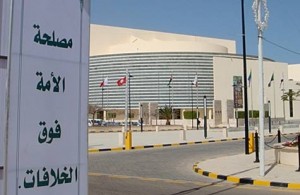
The Arab League Summit is being held in Libya this year by default.
The venue of the conference is determined on a rotational basis among the organisation’s 22 members.
This year it was Iraq’s turn to host the summit meeting: however it was mutually agreed that this might not be an appropriate time.
Next in the roster was Djibouti: but this Republic in the Horn of Africa decided to opt out as host, and so in rotation the summit came to Libya.
Some of the league’s members have a chequered history with Libya, or more particularly with its leader Muammer Gadaffi.
And a large number were concerned about the impact on the event of a leader who’s actions and words have always been somewhat difficult to predict.
Whimsical decision
His first action was to take the whimsical decision to hold the gathering in Sirte – some 500km away from the capital Tripoli with its ample pool of accommodation and established infrastructure.
Sirte is a small town on the Gulf of Sidra, which boasts only one hotel of any size: it does have a newly built international airport and its other claim to fame is that it’s the birth place of Gadaffi.
There is sufficient accommodation for the delegates – but not for the hundreds of journalists who are covering the event.
Getting from Tripoli to Sirte was the easy part. The Libyan government laid on a brand new Airbus to transport the media – but on arrival is where the comfort stopped.
The cruise ship which the Libyan authorities had designated as the journalists accommodation was late in arriving: this led to a scramble to secure private quarters creating what could be described as a landlord’s dream market.
The going rate for a three-bedroom apartment was in the region of $800 a night.
Others who were unable to find occupation or simply could not afford it decided to turn the upper floor of the impressive media centre into a dormitory.
Unlike in the case of the journalists, getting the participants to the conference was the difficult part.
A number of leaders initially said they would not attend because of past or present differences with Gadaffi, among them the Saudi king, the presidents of Yemen and Lebanon, the Moroccan monarch and the sultan of Oman.
Then, at the very first meeting of foreign ministers preparing for the summit, another participant threatened to pull out.
Hoshyar Zabbari, the Iraqi foreign minister, walked out on instructions from his government to protest against a meeting held by the Libyan leader in recent days.
This took place in Sirte itself, where Gadaffi chose to hold talks with Iraqi exiles who had been senior members of the old Saddam regime including the former oil Minister and ambassador to the United Nations.
It was in the eyes of many observers not only ill timed, but provocative.
However, mediators persuaded Iraq to remain – the carrot extended was that the next presidency of the Arab League will be held by Iraq and, importantly, that a communiqué will be issued at the end of the summit endorsing the recent election in Iraq.
‘Jerusalem’ summit
Despite the organisational and diplomatic failings, a strong theme began to emerge – this was to be the Jerusalem summit.
Unlike previous occasions where opposition to Israel itself was largely the only point of unity, the focal point on this occasion is Jerusalem, specifically East Jerusalem.
This is a significant change in tactic: previous summits have ended with routine condemnations of Israel as a state which for the most part resulted in no action whatsoever by the rest of the international community.
Any resolution that ended up in the UN Security Council for example, would be buried through either rejections or abstentions by several members in particular the United States.
However, it would be very difficult for even Israel’s strongest supporter to reject out of hand a resolution stating East Jerusalem to be occupied territory, and therefore the Israeli presence there contrary to international law.
For the first time there is a possibility that a resolution, or series of resolutions, by the Arab League leaders may be acted upon in the wider international community.
The access streets to the conference centre are lined with signs written in green – echoing the Green Book which is essentially the assembled thoughts of Gadaffi and as strong as a constitution in Libya.
They are all about unity: “THERE IS NO TIME FOR DISPUTE. THIS IS A TIME FOR JOINT WORK TO CREATE A SHARED FUTURE” declares one.
“THE INTERESTS OF OUR ARAB NATION IS ABOVE OUR DIFFERENCES,” says another.
And there were indications in the 24 hours before the leaders convened that there might be more in attendance than was initially thought.
A conference that many had feared would be riven by dissent, division and absenteeism could still surprise.
In this, perhaps, the Arab League Summit in Libya is as unpredictable as the man who is hosting it. Aljazeera

Leave a Reply
You must be logged in to post a comment.